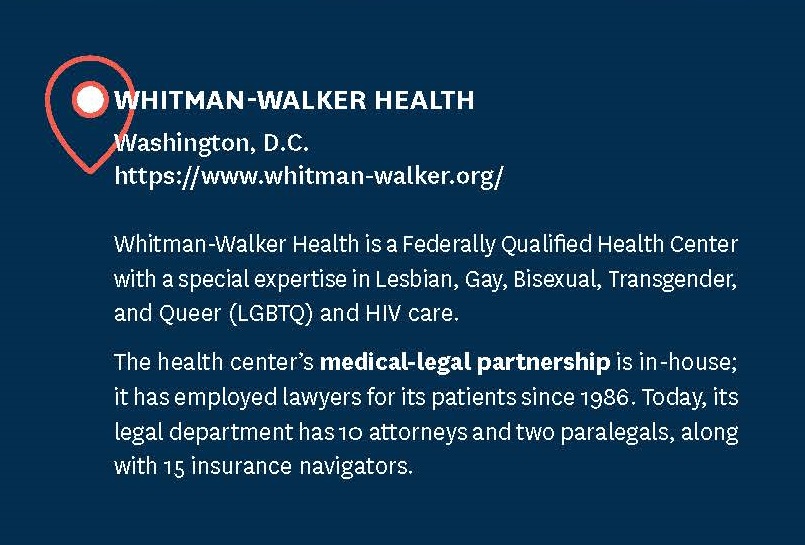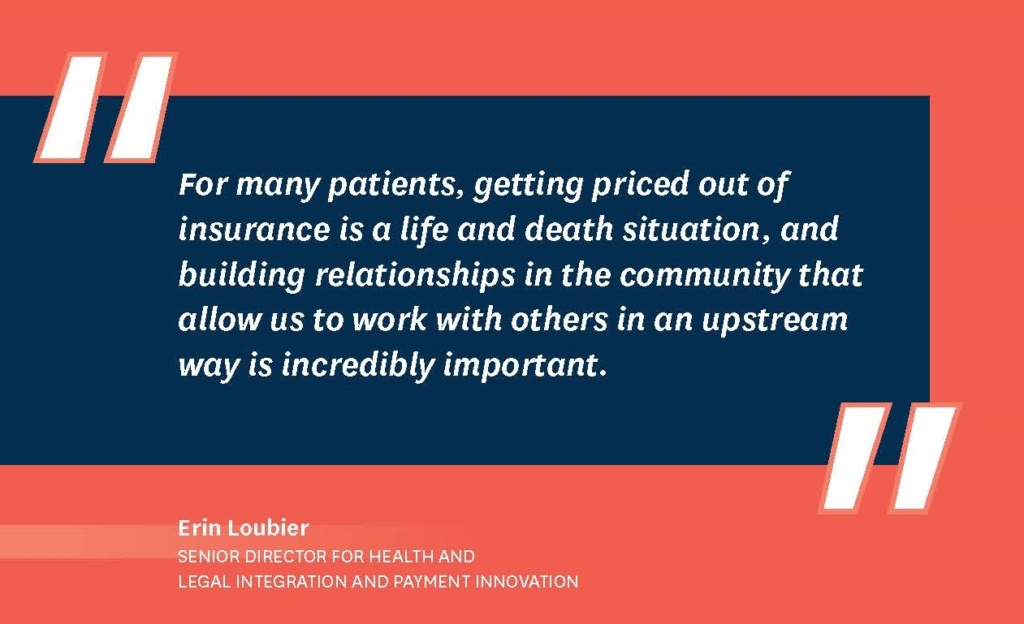When Whitman-Walker Health in Washington, D.C. hired its first in-house lawyer in 1986, it was to help HIV and AIDS patients write wills, secure disability benefits, and fight discrimination—all to ease suffering as they prepared for the end of life. Thankfully, advancements in medical treatment mean that people with HIV and AIDS are living longer, healthier lives. It also means that the health center’s now 10 attorneys, two paralegals, and 15 insurance navigators play a very different role in patient care. Among other things, they lead Whitman-Walker’s health insurance eligibility and enrollment efforts. And that’s how in the Spring of 2016, attorney Erin Loubier came to receive a call from the head of the District’s Health Benefits Exchange Authority (HBX) with news that CareFirst—one of the two biggest insurers in the D.C. Marketplace—intended to discontinue its platinum level plan widely used by Whitman-Walker’s 3,600 HIV-positive patients.
 Medications that were a mere dream thirty years ago can now help reduce a person’s HIV viral load to undetectable levels, meaning they have fewer health complications and are also less likely to transmit the disease to their partners. But these drugs can retail for as much as $2,000 per month, or 40 percent of the median household income in the U.S. So if you need this medicine, and particularly if you are low-income, your health insurance coverage likely determines whether you can afford it, and whether you are forced to make impossible choices between life-saving medications, food, and safe housing.
Medications that were a mere dream thirty years ago can now help reduce a person’s HIV viral load to undetectable levels, meaning they have fewer health complications and are also less likely to transmit the disease to their partners. But these drugs can retail for as much as $2,000 per month, or 40 percent of the median household income in the U.S. So if you need this medicine, and particularly if you are low-income, your health insurance coverage likely determines whether you can afford it, and whether you are forced to make impossible choices between life-saving medications, food, and safe housing.
In May 2016, when the head of HBX Mila Kofman saw that CareFirst submitted its rates for the year and wanted to eliminate its platinum plan, she was immediately concerned and wanted to understand what effect this change would have on the accessibility and cost of care for D.C. residents. One of her first calls was to Loubier, Whitman-Walker’s Senior Director for Health and Legal Integration and Payment Innovation.
Almost all of Whitman-Walker’s HIV-positive patients insured through DC Health Link are on a platinum plan. Loubier and her legal team encourage these patients to choose it because they have frequent health care needs and those plans offered the lowest out-of-pocket costs. Individuals on a platinum plan are responsible for 10 percent of their health care costs; the option with next highest level of coverage is the gold plan, which would make them responsible for 20 percent of costs out-of-pocket. Higher cost sharing can also have a significant impact on medication coverage. The change, Ms. Loubier noted, could price those who most frequently need health care services out of access to care.
 After sharing their concerns with HBX, the health center’s legal team and allies from the Multiple Sclerosis Society, patient advocacy groups, and the city’s HIV/AIDS Hepatitis, STD and TB Administration explained to the insurance commissioner that the elimination of the platinum plan option would leave thousands of people without any options for similar coverage, which would be devastating to both access and cost of care. They also argued that the decision appeared to specifically target people with chronic conditions, and that there was a serious case to be made that this was discrimination. Together, they went to CareFirst, which ultimately agreed to maintain its platinum plan option.
After sharing their concerns with HBX, the health center’s legal team and allies from the Multiple Sclerosis Society, patient advocacy groups, and the city’s HIV/AIDS Hepatitis, STD and TB Administration explained to the insurance commissioner that the elimination of the platinum plan option would leave thousands of people without any options for similar coverage, which would be devastating to both access and cost of care. They also argued that the decision appeared to specifically target people with chronic conditions, and that there was a serious case to be made that this was discrimination. Together, they went to CareFirst, which ultimately agreed to maintain its platinum plan option.
Several months after the initial advocacy, CareFirst wanted to move certain high-cost specialty medications—many used to treat HIV and Multiple Sclerosis—to a percent co-insurance model, meaning that some prescriptions that currently had a flat co-pay of $20, could suddenly skyrocket to as much as $400 per month per medication. Staying connected to HBX and the other partner organizations, Whitman-Walker helped ensure this change was not made, once again ensuring access to lower out-of-pocket costs.
“The early alert from Mila Kofman and her staff was critical because it enabled us all to mobilize early and quickly,” said Ms. Loubier. “For many patients, getting priced out of insurance is a life and death situation, and building relationships in the community that allow us to work with others in an upstream way is incredibly important. And in this case, it meant that there was not any disruption in coverage or care for our patients. That’s the most important thing.”
Story by Kate Marple and Erin Dexter
Click here to download the story PDF.
